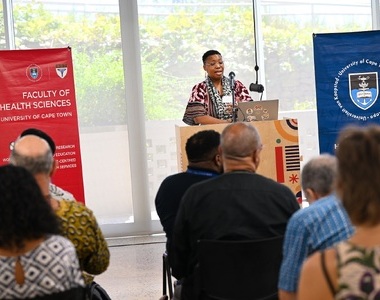The day of the exam
18 October 2019 | Story Sarah Middleton. Photo UCT Archives. Read time 6 min.
It is important to brush up on your study habits well before the exams. Read our article 10 tips for exam preparation to minimise stress and maximise your results.
But what happens on the day of the exam? This guide will help you to plan every aspect of your day so that there are no nasty surprises, and give you information about what to do if you suddenly fall ill or find yourself desperate for some support.
On the day of the exam
- Eat something substantial and drink water before the exam starts.
- Arrive on time. It’s best to double check your exam venue beforehand so that you know exactly where to go and how to get there.
- Ensure that you have enough stationery with you and all the items you need to write the exam. Bring along spare pens and pencils, just in case.
- Dress warmly. Some of the exam venues get chilly, especially when you are sitting still for hours!
Read through the paper first
Once you’ve found your seat in the exam venue and have taken a few calming breaths, turn your paper over and start reading through it. Don’t be tempted to rush into answering the first question. Reading the whole paper first is beneficial for two reasons:
- If there’s anything you are unsure of, your brain files that away and starts to work on it.
- It gives you a chance to see how you will organise your time.
Be strategic
- Do the questions in the order in which you can score the most points.
- Concentrate on the content you know the best.
- If you don’t know the answer to a question, just move on. Don’t lose valuable time stressing about it. If you have time at the end, go back to it.
Know your discipline
Your writing style will depend on the discipline, the question and who the lecturer is. Unless you’re asked to write in bullet points or a different style, write well-written, careful responses to longer questions or essays, with an introductory statement, some substantive statements in the middle and a concluding paragraph.
Always take into account the number of points allocated for an essay. This will give you an idea of how many facts and statements you need to include.
Edit
If you have time left at the end of the exam, read over your paper. Do not simply hand it in and run away; use this extra time wisely. Any answers you didn’t fill in before might be obvious to you now, and if your exam is in the form of an essay, editing is incredibly valuable.
Tip: If your exam is in the form of an essay or essays, always write something. Leaving a whole answer blank will definitely count against you.
Move on
After the exam, you may feel like talking about the paper you have just written and doing a verbal post-mortem. A quick chat is fine, as you need a break, but this is mostly unhelpful as you probably have more exams to write.
Take time to decompress, go for a short walk or sit quietly for 15 minutes. Then return to your quiet study space, change track mentally and get down to preparing for the next exam.
Getting help
If you are feeling overwhelmed, anxious or depressed, talk to someone. Here is how to seek help:
- Peer Counselling sessions are available from 16:30 to 19:00 Monday to Friday at the Ivan Toms building, during which qualified and experienced peer counsellors provide psychosocial support and coping tips. Book online.
- Whatsapp UCT’s telephonic counselling service, the South African Depression and Anxiety Group (SADAG), on 076 8822775 seven days a week between 09:00 and 15:00.
- Dynamic stress relieving technique sessions will be held on Saturday mornings between 10:00 and 12:00 at the Ivan Toms building until 9 November. Email Ingrid Smith at sws@uct.ac.za for more details.
- The UCT Student Care Line (SADAG) 24-hour telephonic service is available on 0800 24 25 26 or send a text message to 31393 for a counsellor to call you back.
- The Crisis Intervention Service (psychiatric night nurse) for residences is available every day from 19:00 by calling CPS on 021 650 2222/3 or tollfree on 080 650 2222.
What if you fall ill?
Here’s the following advice from Student Wellness Service:
Get your support documentation for Deferred Exam (DE) applications on medical or psychological grounds from:
- Ivan Toms Building (Main Clinic) between 08:30 and 16:30 Monday to Friday. It’s not necessary to make an appointment to see the triage nurse for assessment for DE support. Just wait your turn in the queue. Students can also book DE slots via the online booking platform. Limited DE slots will be available between 16:30 and 19:00 (Monday to Friday) and between 10:00 and 14:00 on Saturdays from 19 October to 15 November. These slots must be booked online.
- Hiddingh Campus Clinic between 09:00 and 15:30 Monday to Friday by booking a DE slot online.
Note that ongoing treatment appointments will continue to be available at all other locations as usual. Students can also request DE support from their usual doctors or specialists.
 This work is licensed under a Creative Commons Attribution-NoDerivatives 4.0 International License.
This work is licensed under a Creative Commons Attribution-NoDerivatives 4.0 International License.
Please view the republishing articles page for more information.






























































































































































































































































































































































































































































